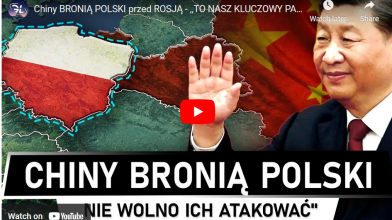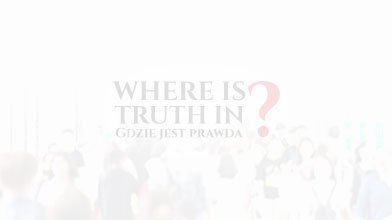How will Poland be in 30 years?
How will Poland be in 30 years?
Wojciech Myślecki, Uklad Otwarty
https://www.youtube.com/watch?v=ZA1NvW1eJaE&t=1681s
This conversation has a particular resonance for me. Wojtek Myślecki is only two years younger than me, we both took an active part in March '68, he in Wrocław, I in Warsaw, of course without knowing about each other. The generation of the sixties, that's us.
What is special about this conversation is that Myślicki is not a social researcher or a student of geopolitics, he is an electronics engineer and therefore his knowledge is more intuitive because it is based on his own observations, participation and reflections.
At (3:50) Myślecki presented a new point of view for me, addressing the reason for this spectacular Russian military weakness shown till now in the war, that antedates the collapse of SU. The argument makes perfect sense to me: he noticed that at the moment in which the flow of information became critical for the rate of development of the economy, the speed of development in the west and the speed of development in SU started diverging. Since the whole socio-political system in SU was based on the absence of individual freedoms and connected with it the absence of the free flow of information in the society, that societal quality choked the SU's economy to a standstill. That's why it collapsed.
At (5:40) presents his view noticing that all powers that be are at present involved in the search for a new system of power distribution in the world, and especially for a new stable equilibrium; it will find it. Myślecki doesn't see at (6:07) any revolutionary wave rising anywhere and that warrants expectation of stability. Rather he sees the new bipolar stable system of US - China. Without Russia as an independent player, which in his opinion, had lost this role for many years to come. Looking from the US - China rivalry point of view it becomes clear why the US will continue to be involved with Poland. Myślecki observes that entry from the east upon the flats of Europe, along the Belt and Road initiative leads through Poland and Ukraine. Therefore who controls the two countries, controls the flow between the East and the West, controls the Belt and Road movements. In fact he says, who owns Poland controls that flow. Conclusion: if the US owns Poland then the US can control that flow. This is the basis of the deep conviction of Myślicki that the US will stay involved both in Poland and in Ukraine. To assure its control of the flow. That is his solution to the question posed by Zychowicz and many others in the Polish media: If the US switches its interests towards the Pacific where it has to deal with China, we again find ourselves between Germany and Russia. What do we do then?
The argument of Myślecki assures that we will not find ourselves left to German-Russian machinations; instead he sees Poland, quite correctly, as the necessary corridor between the East with its Belt and Road initiative and between West Europe with its high rate of economic development. And he sees the control of this corridor as the critical juncture of contemporary geopolitics. Naturally, he sees Poland in a close relationship with the designs of the US, though ultimately it's the position of a well-trusted vassal to a master. A very smart vassal owned by US.
There are two issues:
a) Perception of the absence of revolutionary wave.
b) Who should control the flow between the East and West along the Polish and Ukrainian territories?
Actually, the revolutionary wave is with us, one just needs to see it. I see two of its components:
- There has been a very rapid increase in the number of workers' strikes across America starting more or less in 2020. It reached a dramatic maximum after the murder of George Floyd. Strike for BLM, which started during this time, provided an important example of joining class struggle motivation with the liberation of Black identity.
- Despite the fact of a tremendous military defeat by Russia during the first period of the war starting from the battlefields and ending on sanctions it did not really lose on the economic front, and in fact it scored significant gains by increasing the number of BRIC countries such as Brasil, Saudi Arabia, Argentina and related with it de-dolarization of the market. That's serious. It is the manifestation of the same revolutionary wave against the power that be, that is the United States. That's why despite the seeming contemporary successes in this war which enabled NATO to project its power much beyond, at the same time it starts finding itself in trouble on several fronts.
- The third element of the revolutionary wave, in my opinion, a very new element is the assumption of the role of the world peacemaker by China.
- I would even dare to say that the development of the ultra-right is the manifestation of the same revolutionary wave.
The difference with the past is in that the movements and revolutions were coming out of certain ideologies; at present, we have started without any clear ideology and that gives tremendous freedom to the revolutionary spirit. It can manifest itself in many ways, sometimes difficult to discern.
The issue b) is equally fundamental
It was Myślecki's observation that, especially with the development of Belt and Road Chinese initiative, the Ukraine-Poland corridor between the East and the flats of Europe will be critical to control. As I mentioned earlier, Myślecki favors the US/Poland alliance, which of course, given the political situation in Far East Asia means going against China in the context of US - China rivalry.
I disagree with Myślecki just at this point. It is Poland and Ukraine that should be in the control of their own, unique at present, position. But that would mean leaving the secure hand of US and NATO and starting its own politics based precisely on its unique position between East and West. And this way we come back to the question of Zychowicz: What happens if the US will focus on the Pacific, Poland again will be between Germany and Russia. What do we do then?
The observation of Myslecki about both Poland and Ukraine constituting the unique pathway through which the West and East can be connected by the bidirectional flow of goods between them is excellent and implicitly provides the answer. The central question is how to use that power, the power of being exactly at the center between East and West. Myślecki takes the binary (either/or) framework and ties the position of Poland to US politics.
Where Is Truth?, on the other hand breaks with the rigidity of yes/no and offers a compromise solution that serves the interests of both contenders: Poland as the peacemaker between East and West. Being at the central logistical spot, Poland has the power and possibilities to make sure that the mutual interests of traders from both sides, requirements of their cultures are honestly, without a bias, fulfilled to their full satisfaction. Poland has the possibility to become the bridge of peace instead of continuing to be the bridge of war between East and West, and by becoming that, it will re-introduce a new idea to the European continent, the idea of peace through principled compromise.
Many commentators on social media are pondering the role of Poland in the post-war future (of course if such a future will exist): Bartosiak proposes "Poland as the guardian of Europe" which reminisces the old idea of Poland as the East border of Christianity. Others assert Poland as the rising power in Europe and in the world, with the biggest army on the continent. And behind those dreams there lurks the contemporary main Polish question: Do we count in the world? Are we valuable? Can we be a world power?
Poland has a choice right now: to acquire the respect and love of the nations through the wisdom of peacemaking or to acquire power and political influence among the nations with the help of the biggest army in Europe.


